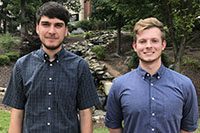Thomas D. Walsh Graduate Research Fellowship Competition | Academic Year 2018/2019

The Thomas D. Walsh Graduate Research Fellowship, made possible by the generous support of Dr. Thomas D. Walsh, recognizes outstanding contributions by M.S. candidates to graduate research. Returning graduate students are eligible for this prestigious award after their first year. The Thomas D. Walsh Graduate Research Fellowship supports the winner with a research assistantship and tuition support through their second year.
During the last application cycle the Master’s Program Committee decided on two finalists: Matthew Freeman and Tim Wallen. A brief biographical sketch and research abstract summarize each finalist’s strong application.
The award winner will be announced to the department by July 18, 2018, briefly recognized during the new graduate student reception on Friday, August 17, and honored during the Walsh Graduate Student Reception 2018 (TBA).
Matthew Freeman is originally from the Charlotte, NC area and received his B.S. in Chemistry at the University of North Carolina at Charlotte in 2018. As an undergraduate student he joined the research laboratory of Dr. Christopher Bejger in 2015 as the first undergraduate group member. Matt was a Charlotte Research Scholar during the summer of 2016. His research has focused on the design and synthesis of molecules and molecular clusters for use as electrolytes in aqueous redox flow batteries. Specifically, he has prepared the first water-soluble cobalt sulfide cluster that has been structurally and electrochemically characterized. He plans to continue investigating metal sulfide clusters as soluble charge storage species during his Masters research. Matt plans to pursue a career in energy storage, preferably researching battery materials at one of the national laboratories.
Redox flow batteries (RFBs) are an emerging technology for grid and microgrid scale energy storage. Large-scale implementation of RFBs, however, is hindered by the cost of the active species, which typically consists of dissolved vanadium salts. The Bejger lab is currently studying metal sulfide clusters as inexpensive alternatives for vanadium-based electrolytes. These clusters play a major role in several biological redox processes, exhibiting high efficiency and electrochemical reversibility. Additionally, synthetic metal sulfide clusters can be prepared from a large variety of metals and are known to exist in numerous geometries. Phosphine ligands, which stabilize the cluster-core, can be modified to tailor the solubility, geometry, and electronic properties. Matt’s thesis goal is to produce inexpensive, efficient, and non-toxic electrolytes using clusters comprising iron and sulfur.
Tim Wallen earned his B.A. in chemistry from Hendrix College in Conway, Arkansas in 2011. During this time he did undergraduate research with Dr. Tom Goodwin through the identification of volatile compounds in binturong (Asian bearcat) urine samples in a collaboration with Dr. Christine Drea of Duke University. He was also a summer undergraduate research experience (SURE) fellow at Emory University during this time in the laboratory of Dr. James Kindt running molecular dynamic simulations of the phospholipid bilayer in order to study molecular self-assembly. After graduation, Tim spent time working in environmental chemistry labs as chemist responsible for sample extractions as well as wet chemistry analytical techniques. Before pursuing his MS at UNC Charlotte he most recently spent time as an ORISE research fellow at the CDC in the clinical chemistry branch in the lipid reference laboratory (LRL) to set target values for clinical measurement techniques including HDL cholesterol and triglycerides. He is wanting to apply his knowledge of chemistry and passion of home brewing to working in quality control in the brewing industry upon graduation of the MS program.
Tim currently works in the Dr. Jay Troutman laboratory studying complex glycan synthesis in bacteria. His research is particularly focused on the in vitro analysis of a glycotransferase, WecG, in the Enterobacterial common antigen (ECA) pathway, a biosynthetic pathway that is responsible for the synthesis of an antigen, a capsular polysaccharide found on the surface of gram-negative bacteria. The Enterobacterial common antigen (ECA) pathway is of particular importance as it is found in every member of the large Enterobacteriaceae family that are gram-negative bacteria and include pathogens such as Salmonella, Escherichia, Yersinia, Klebsiella, and Shigella. WecG is an N-acetyl-D-mannosaminuronic acid (ManNAcA) transferase and is responsible for the synthesis of the Lipid II intermediate, BPP-GlcNAc-ManNAcA in the ECA pathway. Using fluorescent bactoprenyl (BP) probes that have been previously used in Dr. Troutman’s lab with success to study this enzyme in vitro will help in confirming the activity of WecG in the ECA pathway, probe for potential new polysaccharide products produced by WecG, and comparing its activity to another enzyme found in Brucella ovis (Bo), BoWecG, of the same gene family.